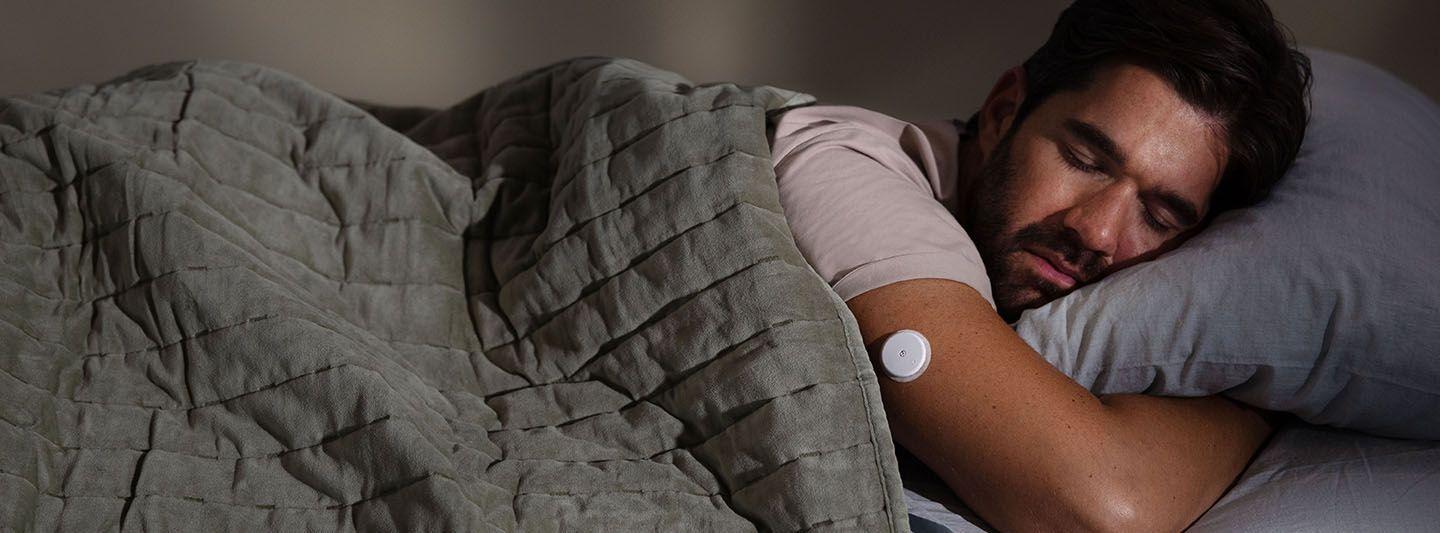How much sleep is enough for good health? What the research says
Learn about how much sleep is enough for adults each night for optimal health.
Emily Shiffer,
Contributing Writer
Sarah Koenck, MS, RD,
Medical Affairs
Published:
February 19, 2025
Updated:
March 13, 2025
Read time:
4 minutes

How much sleep individuals need depends on many factors, but according to science, adults need between 7 and 9 hours a night.
Sleep is crucial for good physical and mental health. Poor sleep can negatively impact your metabolic health, immune system, overall energy, focus, and mood.
Taking short naps when needed can be beneficial, while long naps have been found to have negative effects on health.
Start Lingo today for just $49
Learn how your body responds to food and exercise with a 2-week plan*, no commitment.
Buy now
Sleep is one of the most important pillars of overall health. Failing to get enough sleep has been linked to an increased risk for many health problems, including type 2 diabetes, high blood pressure, obesity, heart disease and stroke, worse mental health, and more. 1
Additionally, poor sleep can have immediate effects on your metabolism, leading to higher glucose levels. 2 In turn, higher glucose can lead to worse sleep, creating a vicious cycle. 3
If you struggle to sleep, you may be wondering: How much sleep do adults actually need? Achieving quality sleep will improve your overall health, including managing your glucose and metabolism. Keep reading to learn about how much sleep is enough for good health.
How much sleep is recommended for adults?
The consensus by leading sleep experts is that adults need between 7 and 9 hours of sleep a night, and these recommendations don’t change much as you age. 4
However, sleeping more than 9 hours a night may be helpful for certain individuals such as young adults, people who are recovering from sleep deprivation, and people dealing with sickness. 5
Have you noticed that you may feel more “awake” after getting less sleep? This happens sometimes when you’re sleep-deprived. Your brain is working overtime to compensate for the sleep you missed by pumping cortisol (the stress hormone) into your body to keep you more awake. Over time, this can lead to emotion regulation issues, decreased cognition, and increased inflammation. 6, 7 Cortisol also increases glucose. 8
Does it matter when I sleep?
When you sleep also has an impact on the quality of your sleep. Maintaining a regular sleep schedule has been found to help regulate your circadian rhythm, which is your body’s “internal clock” that helps you get sleepy at night and feel more alert and awake during the day. 9
Night owls often experience poor sleep quality. Going to sleep before midnight helps regulate your circadian rhythm, whereas individuals who go to sleep after midnight have been found to have a higher risk of psychological disorders, diabetes, and an overall shorter lifespan. 10
However, squeezing in extra sleep with daytime naps may benefit your overall health, if you’re intentional about it and they’re short. Research has found that naps lasting between 15-30 minutes are the most beneficial and can help increase alertness without affecting your ability to fall asleep at bedtime. 11 Daytime naps can also help maintain brain health as you age. Habitual naps have been linked to larger total brain volume and better cognitive performance. 11, 12
Naps that are an hour or longer have been studied to have several negative effects on health. That’s because naps lasting longer than an hour cause your body to go into the deepest level of sleep, called slow-wave sleep. Waking from this can cause something called “sleep inertia” and disrupt your alertness and wakefulness once your nap ends. 13
One study found that older adults who regularly napped for an hour or longer were 40% more likely to develop Alzheimer’s than participants who did not nap (or napped for less than an hour each day). 14 Nappers have also been studied to have an increased risk for high blood pressure and stroke compared to non-nappers. 15
How sleep impacts your metabolism
Sleep plays a huge role in your metabolism. 16 A lack of sleep causes an increase in insulin resistance, which impacts hunger and feelings of fullness. 17 It’s also been linked to craving junk foods that are high in carbs and sugar 18 and can make it harder to lose weight.
Insufficient sleep has also been shown to lead to poorer glucose control the following day 2 and poor glucose control can lead to poor sleep. 3 While long-term consequences could mean metabolic issues down the road, like type 2 diabetes, the lack of glucose control will also have short-term implications for things outside of sleep like your memory, focus, and mood. 19
In addition to its impact on metabolism, sleep affects practically every part of your body, including your heart health, circulatory system, immune system, respiratory system, memory, cognitive abilities, and more. 9
A final note from Lingo
Sleep is one of the most important factors for good physical and mental health. Adults should aim to sleep 7 to 9 hours each night for the most health benefits. Catching up on sleep with naps that are 30 minutes or less may benefit health, while naps longer than 1 hour may have negative health effects.
Using a continuous glucose monitor like Lingo can help you understand your habits and patterns and work towards limiting glucose spikes, which may also improve your sleep.
The Lingo Glucose System is intended for users 18 years and older not on insulin. It is NOT intended for diagnosis of diseases, including diabetes.
The Lingo program does not guarantee that everyone will achieve the same results as individual responses may vary. Consult your healthcare professional before making changes to your diet or exercise regimen or if you have an eating disorder or a history of eating disorders.
© 2025 Abbott. All rights reserved. The biosensor shape and appearance, Lingo, and related brand marks are marks and/or designs of the Abbott group of companies in various territories. Other marks are the property of their respective owners.
ALB-01974
Published:
February 19, 2025
Updated:
March 13, 2025
Read time:
4 minutes


Emily Shiffer is a contributing lifestyle and wellness writer at Lingo. She has worked as a writer for over 10 years, covering health, wellness, fitness, and more in publications such as Women’s Health and Runner’s World. Currently residing in Charleston, South Carolina, Emily enjoys instructing barre, surfing, and long walks on the beach with her miniature dachshund, Gertrude.


Sarah Koenck, MS, RD, is a Medical Affairs Specialist at Lingo. She’s been a registered dietitian since 2011 and has a master's degree in kinesiology from A.T. Still University. She spent the first part of her career as a clinical dietitian in the ICU before moving onto specializing in diabetes and weight management in the digital health space. Her personal health journey, including living with type 1 diabetes for almost 30 years and wearing a continuous glucose monitor for almost 20, has driven her commitment to help others at Lingo.
A healthy choice for your inbox
Sign up for Lingo emails to get science-backed tips, special offers, and The Journey Newsletter.
Start Lingo today
for just $49
Learn how your body responds to food and exercise with a 2-week plan*, no commitment.
- 1 Lingo biosensor with minute-by-minute glucose monitoring.
- Full access to the Lingo app.
- Available over the counter. No prescription needed.
- Works with iOS and AndroidTM
Shop now
Free shipping | 30-day money-back guarantee†
*No commitment. This plan does not auto-renew.
†30-day money-back guarantee is for first time purchases only

